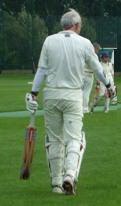 |
| Wagner |
Fantasy Bob has noted that making his debut for New Zealand in the First Test against West Indies which started this week in Antigua is left arm seamer Neil Wagner.
As far as FB knows this Wagner is no relation to
the Wagner, that is Richard Wagner, composer of the Ring Cycle. He may well be, but chooses not to draw attention to it, for even at the distance of 150 years Richard Wagner remains controversial in some respects. Wagner’s, that is Richard Wagner, not Neil, views on cricket are not known. His biography suggests that he was not a man likely to walk after gloving it behind. But at another level, he might well have viewed the game as an expression of his concept of the gesamtkunstwerk – the total art work – had he thought about it. FB still awaits the imaginative producer who will use an Ashes Series as the background to a presentation of the Ring Cycle. In fact FB offers his services to any opera house willing to put on such a show. He is sure it would be a sure fire hit.
However Neil Wagner
is a South African recruit to the New Zealand cause which has been stuttering
of late. His first day as a Test bowler
was not as successful as he might have hoped. He started the day at the crease
for he had been sent in the previous evening as night watchman; he did not
survive for long before being caught at slip off Sunil Narine for 4. Then as the West Indies innings gained
momentum, his first 5 overs in Test cricket went for 35 as Chris Gayle, on his
return to Test cricket, took a liking to him.
The next day was not all that great either as the West Indies openers piled on the runs. On the third day, Wagner got his first Test wicket getting Kieran Powell to chase a wide won - the previous 3 balls in the over had each gone for 4.
His treatment in
Antigua was so different from his astonishing bowling spell for Otago against
Wellington in 2010 when he took 5 wickets in a single over. While other bowlers in First Class Cricket
have taken 5 wickets in 6 balls, Wagner appears to be the only bowler to have
done this in one over. Now that was truly a Wagnerian
achievement.
 |
| Wagner |
Perhaps Neil Wagner should not
worry too much about his debut. For the
debut of his namesake the Wagner, Richard, was not a triumph either. His first
staged work was Das Liebesverbot (The Ban on Love), based on
Shakespeare's Measure for Measure. Performed at Magdeburg in 1836, it closed after one performance, leaving the
composer in serious financial difficulties – a recurring theme in Wagner’s
life.
It was not until 1843 that he met
with some success in the theatre when The Flying Dutchman was presented for the
first time in Dresden. It is said that
he took the inspiration for this work from a stormy sea passage to London
in 1839 to where he was fleeing from creditors.
The Flying Dutchman tells the
tale of a skipper who is cursed to bowl up the hill against the wind forever without rest. An angel brought to him
the terms of his redemption: every seven years the waves will cast him upon the
shore; if he can find a wife who will be true to him he will be released from
his curse, and get a LBW decision in his favour. This is obviously based on FB’s career - except for the part about redemption. Test Match Quality.
Scottish Opera will be presenting this great work in the autumn. Be there.
In the meantime - try the overture to Neil Wagner's next bowling spell played on
this link by the Orchestra of the Metropolitan Opera in NY conducted by James Levine.




Having found a true wife in Mrs FB, it is unfortunate that FB has been denied redemption (but that's women for you) and is therefore condemned to touring endlessly round rain-soaked Scottish cricket grounds looking for a game. Wagner at least had the benefit of setting much of his Ring Cycle underground, where rain could not stop play.On a lighter note, FB will no doubt have been delighted by the sight of a cricket match, unaffected by rain, opening Danny Boyle's Olympic extravaganza last night. Almost Test Match quality.
ReplyDeleteMany thanks - all FB can understand from Mr Boyle's representation is that the industrial revolution stopped the playing of cricket altogether in favour of the continual playing of drums.
ReplyDeleteIndeed. It seems we have Brunel to thank for that.
Delete